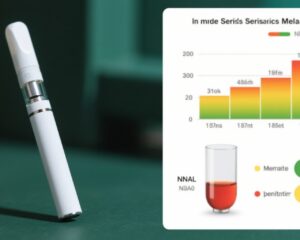Highlights
- Esketamine significantly improves smoking cessation rates in lung cancer patients with major depressive disorder (MDD), confirmed by biologic verification at 6 months.
- Intranasal esketamine effectively reduces depressive and anxiety symptoms and enhances cognitive function in patients with concurrent lung cancer and MDD.
- Real-world studies confirm the safety, tolerability, and therapeutic benefits of esketamine nasal spray in treatment-resistant depression (TRD), with sustained remission and functional improvements over long-term use.
- Long-term extension studies show no new safety signals with esketamine use combined with oral antidepressants; improvements in depression symptoms generally persist with maintenance treatment.
Background
Lung cancer is closely associated with tobacco smoking, which also increases the risk of major depressive disorder (MDD). Smoking cessation is challenging in patients with lung cancer and comorbid depression, leading to poorer cancer outcomes and quality of life. Treatment-resistant depression (TRD), characterized by inadequate response to multiple antidepressants, remains a substantial clinical challenge. Esketamine, a stereoisomer of ketamine, administered via intranasal route, has emerged as a rapid-acting antidepressant approved for TRD. Understanding its efficacy and safety in smoking cessation among lung cancer patients with MDD and in TRD is critical for optimizing treatment strategies.
Key Content
Efficacy and Safety of Esketamine for Smoking Cessation in Lung Cancer Patients with MDD
Hong et al. (2025) conducted a multicenter randomized, placebo-controlled clinical trial enrolling 236 patients diagnosed with lung cancer and MDD. Patients received 8 weekly intranasal sessions of esketamine (ESK) or placebo. Primary outcomes were self-reported and biologically verified continuous abstinence rates at 6 months follow-up. Esketamine treatment significantly improved self-reported abstinence to 44.1% and biologically verified abstinence to 28.8%, compared to placebo. Secondary outcomes revealed significant reduction in depression and anxiety severity, alongside cognitive function improvement in the ESK group. Nicotine dependence, urge to smoke, and smoking-related respiratory symptoms also decreased. Importantly, no serious adverse events were reported, underscoring a favorable safety profile.
Real-World Evidence of Esketamine Nasal Spray in Treatment-Resistant Depression
The INTEGRATE study (Molero et al., 2025), a retrospective observational study in Spain including 196 adults with TRD, assessed real-world effectiveness and safety of esketamine nasal spray (ESK-NS). Clinical judgment rated 80.4% of evaluable patients as responders or in remission during induction, improving to 90% in maintenance. About 28% of patients experienced symptom improvement within 24 hours after the first dose. Most adverse events were mild and declined over time, with no need to discontinue therapy.
Similarly, Samalin et al. (2024) reported outcomes from a French real-world study of 157 TRD patients treated with ESK. At one month, 40.2% achieved clinical response and 19.7% remission. Despite 79.6% of patients discontinuing ESK within 12 months, those remaining showed sustained benefits. Adverse events were common but manageable; serious adverse events occurred in 17.2% and led to treatment discontinuation in 14.6%. Work resumption rates improved, reflecting functional recovery.
Longitudinal Safety and Efficacy in TRD: The SUSTAIN-3 Extension Study
Zaki et al. (2025) conducted SUSTAIN-3, a phase 3 open-label extension of multiple parent trials, enrolling 1148 adults with TRD. Esketamine nasal spray was combined with oral antidepressants over a median of 43 months. The common adverse events mirrored registration trials—headache, dizziness, nausea, dissociation, among others—but no new safety signals emerged. Depression symptom reduction measured by Montgomery-Åsberg Depression Rating Scale (MADRS) persisted over long-term maintenance, with remission rates of approximately 48-50% at one to two years.
Mechanistic and Additional Clinical Insights
Mechanistic studies suggest esketamine exerts rapid antidepressant effects via N-methyl-D-aspartate receptor (NMDAR) antagonism and cortical disinhibition (Schmidt et al., 2025). Intranasal delivery enables rapid brain penetration and onset of action, which is vital for acute symptom relief in TRD and depression associated with lung cancer. Additionally, esketamine’s anti-inflammatory properties may contribute to improvements in postoperative neurocognitive outcomes and delirium reduction in frail elderly lung cancer patients (Wang et al., 2025).
Expert Commentary
The randomized trial by Hong et al. represents a significant advance in addressing the dual challenge of smoking cessation and comorbid depression in lung cancer patients. The combination of improved abstinence rates, reductions in depressive and anxiety symptoms, and enhanced cognitive function provides a compelling rationale for integrating esketamine into multidisciplinary care. The favorable safety profile, with no serious adverse events, supports its clinical applicability.
Real-world evidence from the INTEGRATE and French studies confirms esketamine nasal spray’s effectiveness and tolerability in routine clinical practice for TRD. While discontinuation rates remain high, consistent with complex patient populations, responders experience sustained symptom relief and functional gains. The SUSTAIN-3 extension study further reassures clinicians regarding long-term safety and sustained efficacy, critical given the high relapse rates in TRD.
Limitations include variability in study designs, open-label nature of real-world studies, and limited long-term data in specific populations such as cancer patients. Further randomized controlled trials are warranted for smoking cessation in diverse cancer cohorts and to optimize dosing regimens. The biological underpinnings, including neuroinflammation modulation and neuroplasticity enhancement by esketamine, merit continued investigation.
Conclusion
Esketamine shows promising efficacy and safety profiles for smoking cessation in lung cancer patients with major depression and has a validated role in managing treatment-resistant depression. It offers rapid symptomatic relief, improves functional outcomes, and is generally well tolerated in both controlled trials and real-world settings. Ongoing research is essential to establish long-term benefits, refine patient selection, and integrate esketamine into comprehensive oncologic and psychiatric care pathways.
References
- Hong X, Xu S, Sun G, et al. Efficacy and safety of esketamine for smoking cessation among patients diagnosed with lung cancer and major depression disorder: A randomized, placebo-controlled clinical trial. J Affect Disord. 2025;383:1-10. doi:10.1016/j.jad.2025.04.077. PMID: 40274117.
- Molero P, Ibañez A, de Diego-Adeliño J, et al. A Real-World Study on the Use, Effectiveness, and Safety of Esketamine Nasal Spray in Patients with Treatment-Resistant Depression: INTEGRATE Study. Adv Ther. 2025;42(5):2335-2353. doi:10.1007/s12325-025-03149-z. PMID: 40106175.
- Samalin L, Mekaoui L, Rothärmel M, et al. Use of Esketamine Nasal Spray in Patients with Treatment-Resistant Depression in Routine Practice: A Real-World French Study. Depress Anxiety. 2024;2024:7262794. doi:10.1155/2024/7262794. PMID: 40226655.
- Zaki N, Chen LN, Lane R, et al. Safety and efficacy with esketamine in treatment-resistant depression: long-term extension study. Int J Neuropsychopharmacol. 2025;28(6):pyaf027. doi:10.1093/ijnp/pyaf027. PMID: 40319349.



